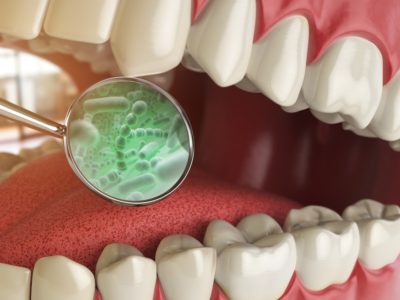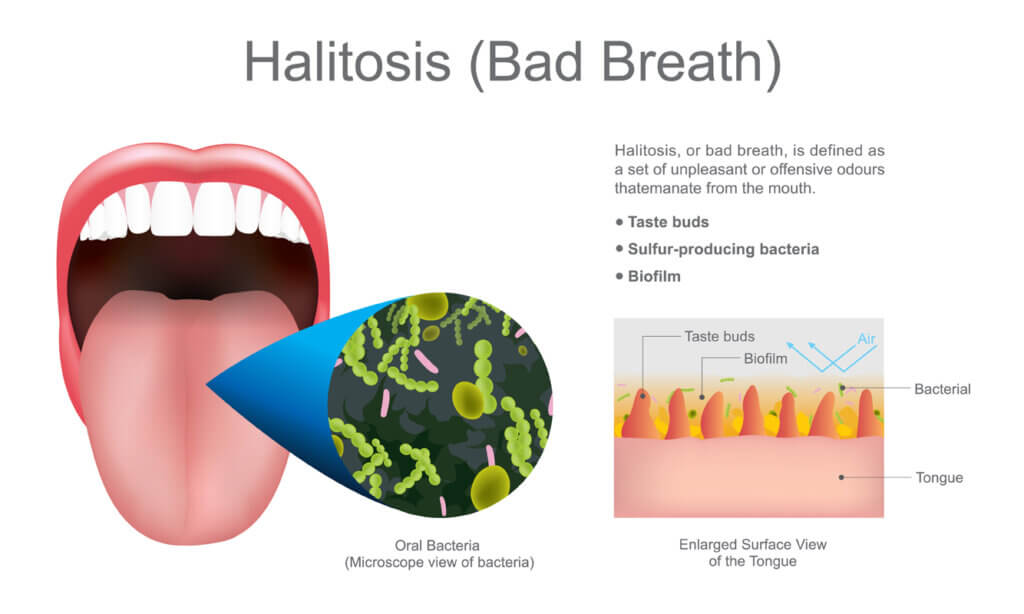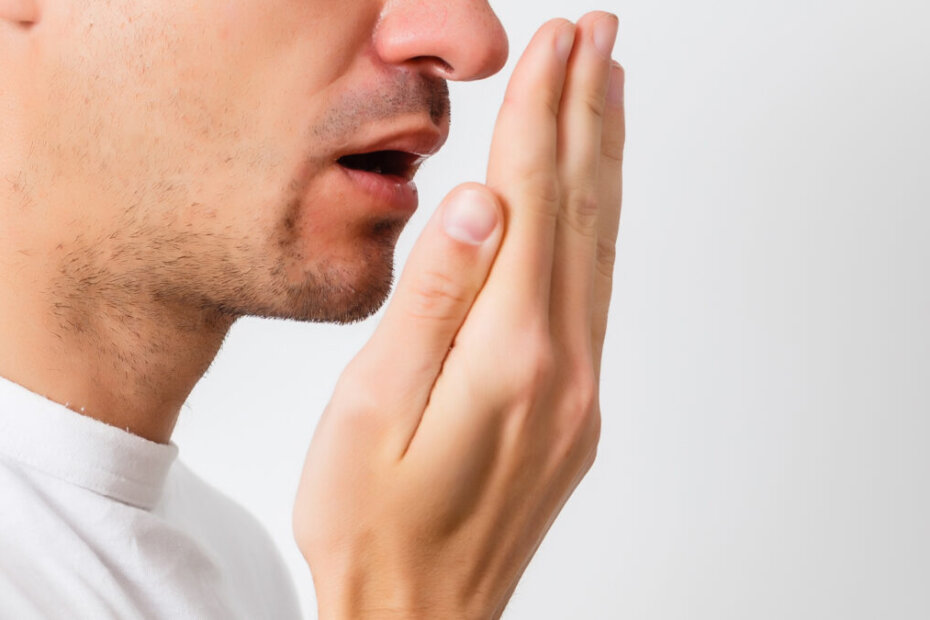Bad breath, also called halitosis, can be embarrassing and in some cases may even cause anxiety. It’s no wonder that store shelves are overflowing with gum, mints, mouthwashes and other products to fight bad breath. But many of these products are only short-term measures. That’s because they don’t address the cause of the problem.
Certain foods, health conditions and habits are among the causes of bad breath. In many cases, you can make bad breath better by keeping your mouth and teeth clean. If you can’t solve bad breath yourself, see your dentist or another healthcare professional to be sure a more serious condition isn’t causing it.
Symptoms
Bad breath odors vary, depending on the cause. Some people worry too much about their breath even though they have little or no mouth odor. Others have bad breath and don’t know it. Because it’s hard to know how your breath smells, ask a close friend or relative to confirm if you have bad breath.
When to see a doctor
If you have bad breath, review how you keep your mouth and teeth clean. Try making lifestyle changes, such as brushing your teeth and tongue after eating, using dental floss, and drinking plenty of water.
If you still have bad breath after making changes, see your dentist. If your dentist thinks a more serious condition is causing your bad breath, you may need to see another healthcare professional to find the cause of the odor.
Causes
Potential causes of bad breath include:
- Tobacco: Tobacco products cause their own types of mouth odor. Additionally, they increase the chances of gum disease which can also cause bad breath.
- Food: The breakdown of food particles stuck in the teeth can cause odors. Some foods such as onions and garlic can also cause bad breath. After they are digested, their breakdown products are carried in the blood to the lungs where they can affect the breath.
- Dental hygiene: Brushing and flossing ensure the removal of small particles of food that can build up and slowly break down, producing odor. A film of bacteria called plaque builds up if brushing is not regular. This plaque can irritate the gums and cause inflammation between the teeth and gums called periodontitis. Dentures that are not cleaned regularly or properly can also harbor bacteria that cause halitosis.
- Crash diets: Fasting and low-carbohydrate eating programs can produce halitosis. This is due to the breakdown of fats producing chemicals called ketones. These ketones have a strong aroma.
- Drugs: Certain medications can reduce saliva and, therefore, increase odors. Other drugs can produce odors as they breakdown and release chemicals in the breath. Examples include nitrates used to treat angina, some chemotherapy chemicals, and some tranquilizers, such as phenothiazines. Individuals who take vitamin supplements in large doses can also be prone to bad breath.
- Foreign body: Bad breath can be caused if they have a foreign body lodged in their nasal cavity, especially in children.
- Diseases: Some cancers, liver failure, and other metabolic diseases can cause halitosis, due to the specific mixes of chemicals that they produce. Gastroesophageal reflux disease (GERD) can cause bad breath due to the regular reflux of stomach acid.
- Not keeping your mouth and teeth clean. If you don’t brush and floss daily, food particles remain in your mouth, causing bad breath. A colorless, sticky film of bacteria called plaque forms on your teeth. If not brushed away, plaque can irritate your gums. Eventually, it can form plaque-filled pockets between your teeth and gums. The early stage of gum disease is known as gingivitis. Late-stage gum disease with bone loss is called periodontitis. Your tongue also can trap bacteria that produce odors. Dentures also can collect odor-causing bacteria and food particles, as can fixed or removable oral appliances such as braces that aren’t cleaned regularly or don’t fit properly.
- Dry mouth. Saliva helps cleanse your mouth, removing particles that cause bad odors. A condition called dry mouth or xerostomia (zeer-o-STOE-me-uh) can be a part of bad breath because you produce less saliva. Dry mouth naturally occurs during sleep, leading to “morning breath.” It gets worse if you sleep with your mouth open. Constant dry mouth can be caused by a problem with the glands that produce saliva and by some diseases.
Infections in your mouth.
Surgical wounds after mouth surgery, such as tooth removal, as well as tooth decay, gum disease or mouth sores, can cause bad breath.
- Other mouth, nose and throat conditions. Small stones that form in the tonsils, called tonsil stones or tonsilloliths, are covered with bacteria that can cause bad breath. Infections, or constant swelling in the nose, sinuses or throat, can lead to postnasal drip. This is when fluid from your nose runs down the back of your throat. This condition also can cause bad breath.
As mentioned earlier, the most common reason for bad breath is oral hygiene, but other situations can also be to blame.
Rarer causes of bad breath include:

- Ketoacidosis: When the insulin levels of a person with diabetes are very low, their bodies can no longer use sugar and begin to use fat stores instead. When fat is broken down, ketones are produced and build up. Ketones can be poisonous when found in large numbers and produce a distinctive and unpleasant breath odor. Ketoacidosis is a serious and potentially life-threatening condition.
- Bowel obstruction: Breath can smell like feces if there has been a prolonged period of vomiting, especially if a bowel obstruction is present.
- Bronchiectasis: This is a long-term condition in which airways become wider than normal, allowing for a build-up of mucus that leads to bad breath.
- Aspiration pneumonia: A swelling or infection in the lungs or airways due to inhaling vomit, saliva, food, or liquids.
Risk factors
Your risk of bad breath is higher if you eat foods known to cause bad breath, such as garlic, onions and spices. Smoking, not keeping your mouth clean and some medicines also can play a part, as can dry mouth, infections of the mouth and some diseases. In addition, other conditions such as GERD or cancer can lead to bad breath.
Fast facts on bad breath
Here are some key points about bad breath. More detail and supporting information is in the main article.
- Bad breath is estimated to affect 1 in 4 people globally.
- The most common cause of halitosis is bad oral hygiene.
- If particles of food are left in the mouth, their breakdown by bacteria produces sulfur compounds.
- Keeping the mouth hydrated can reduce mouth odor.
- The best treatment for bad breath is regular brushing, flossing, and hydration.
Diagnosis
Your dentist likely will smell the breath from your mouth and the breath from your nose and rate the odor on a scale. Because the back of the tongue most often causes the smell, your dentist also may scrape it and rate its odor.
Some devices also can detect certain chemicals that cause bad breath. But these tools aren’t always available.
How do I know if my breath stinks?
If you have a bad taste in your mouth, you probably have a mouth odor that others can smell. To find out for sure, have an assessment with your dentist.
Management and Treatment
How is halitosis treated?
Halitosis treatment depends on the root cause of the issue. For example, if bad breath is due to poor oral hygiene, a dental cleaning and improved oral hygiene at home will likely help.
But if halitosis is a symptom of another condition somewhere else in your body, your primary healthcare provider can help you with proper diagnosis and treatment.
Occasionally, your dentist may recommend special mouth rinses to combat certain bacteria in your mouth.
How can I permanently get rid of bad breath?
As mentioned above, treating the underlying condition is the only halitosis cure. Gum and breath mints only cover up the problem.
Once your healthcare provider determines what caused halitosis, they can create a treatment plan tailored to your specific needs.

Prevention
How can I prevent halitosis?
Proper oral hygiene is the best way to keep your breath smelling clean and fresh. Here are some general guidelines:
- Brush twice a day, for at least two minutes each time, and floss once a day. Remember to clean your tongue with your brush or a tongue scraper, which you can buy in the oral health aisle.
- Use an alcohol-free antibacterial mouthwash.
- See your dentist regularly for checkups and cleanings. For some people, this may be every six months. But others may need more frequent visits to keep their oral health in check.
- Drink a lot of water to help prevent dry mouth.
- Boost the production of saliva by using sugar-free chewing gum, sucking on sugar-free candy or eating healthy foods that require a lot of chewing. Your dentist might recommend or prescribe products that can produce artificial saliva or help your body produce saliva.
- Avoid alcohol, caffeine and tobacco products because they can dry out your mouth.
What’s the best technique for brushing my teeth?
Here are some tips and tricks for brushing your teeth properly:
- Use a soft-bristled toothbrush. Be sure its size and shape allow you to reach all areas of your mouth.
- Replace your toothbrush at least every three or four months — or more often if it looks worn.
- Hold your toothbrush at a 45-degree angle toward your gums and use short strokes, about the width of a tooth. Make sure you get to the outside, inside and top of each tooth.
- Don’t press down hard on your brush. Aggressive brushing or using a hard-bristled brush could cause gum recession.
What’s the best technique for flossing my teeth?
Cleaning between your teeth is just as important as brushing. Floss can clean places that your toothbrush can’t reach. To floss properly:
- Break off about 18 inches of floss and wrap it around your middle fingers.
- Use your thumbs and forefingers to hold the floss tightly so there’s an inch or two of it between your fingers.
- Guide that middle section between your teeth, wrap the floss around one tooth (in a “C” shape), and rub up and down the length of that tooth seven to 10 times. (Note: Friction is necessary to remove plaque from your teeth surfaces. Water flossers are great for removing large pieces of food and debris. But if you use a water flosser, be sure you also use regular floss.)
- Now, wrap the floss around the neighboring tooth and repeat these steps.
If you haven’t been flossing, there might be some bleeding and discomfort for the first few days, but that should go away.
Outlook / Prognosis
What can I expect if I have halitosis?
Most people can get rid of chronic halitosis by treating the underlying condition. That could be as simple as improving your oral hygiene routine.
If chronic bad breath is due to an underlying health condition, then there may be some trial and error to figure out what works for you. Your healthcare provider may need to try different medications or change your dosages. Or they may ask to run more tests to determine the exact cause.
Living With
When should I see my healthcare provider?
If you practice good hygiene and you still have halitosis, schedule an appointment with your dentist at WHITE ALIGN DENTAL CARE. Some people build up plaque faster than others and may just need more frequent cleanings. You can also schedule an appointment with a periodontist (gum disease specialist) at WHITE ALIGN DENTAL CAREwho can see if gum disease is the cause of halitosis.
If your dentist doesn’t find any oral health issues — such as cavities or gum disease — then your primary care physician can determine if another condition is causing halitosis.
Halitosis is a common condition that can cause embarrassment or low self-esteem. But bad breath isn’t something to be ashamed of. It’s often just your body’s way of telling you that something isn’t quite right. The good news is that you can usually get rid of halitosis by treating the underlying health condition. Your dentist and primary care physician can work together to find out what’s effective for you.
Treatment
To reduce bad breath, help avoid cavities and lower your risk of gum disease, regularly keep your mouth and teeth clean. Further treatment for bad breath can vary. If your dentist thinks another health condition is causing your bad breath, you likely will need to see your primary healthcare professional or a specialist.
Your dentist will work with you to help you better control bad breath caused by mouth issues. Dental measures may include:
- Mouth rinses and toothpastes. If your bad breath is due to a buildup of bacteria called plaque on your teeth, your dentist may recommend a mouth rinse that kills the bacteria. Your dentist also may recommend a toothpaste that contains an antibacterial agent to kill the bacteria that cause plaque buildup.
- Treatment of dental disease. If you have gum disease, your dentist may suggest that you see a gum specialist, known as a periodontist. Gum disease can cause gums to pull away from your teeth, leaving deep pockets that fill with odor-causing bacteria. Sometimes only professional cleaning removes these bacteria. Your dentist also might recommend replacing faulty fillings, a breeding ground for bacteria.
To book an appointment with us at, ‘White Align Dental Care’– call us on 070284 83531. We pride ourselves to have the best cosmetic dentist in South Delhi. You can also mail us on whitealign.dentalcare@gmail.com.

